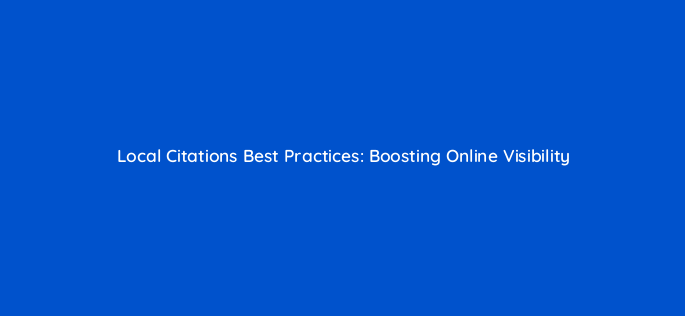Advertisement
It’s paramount for businesses in this digital age to be visible, especially locally. That said, local citations and listings of their name, address, and phone number (NAP) on various websites and directories play a crucial role in their success. They are powerful tools in the sphere of local search engine optimization (SEO). Why’s that so? It’s for the simple reason that these citations influence how a business ranks in local search results and how potential customers find them.

Follow these six fundamental citation best practices to boost your local SEO and make your business more discoverable across the web:
- Accuracy and consistency
The foundation of effective local citations lies in the accuracy and consistency of the information provided. Incorrect or inconsistent name, address, and phone number (NAP) details across directories, which can be brought about by loads of factors (such as opening or closing stores or changing business locations), can negatively impact visibility and, thus, shoo prospective customers away.
What needs to be done, then? Businesses ought to conduct regular citation audits using specialized software tools or citation-building services like SEOBuilder to identify and fix inaccuracies or inconsistencies. Details like addresses, phone numbers, and business names/descriptions should be uniformly presented on all platforms, which include your website, social media pages, and third-party listing sites.
Take this for example: a business moves locations or gets a new phone number. It’s important to update such pieces of information at all sites and directories where they’re listed at the soonest possible time. This way, local search visibility won’t have to suffer. Outdated business details on just a few directory listings can still hurt local search performance and ranking opportunities.
- Choosing the right platforms
Not all citation platforms carry equal weight when influencing local search ranking and visibility for targeted customers. Business owners must strategically determine where to focus initial citation-building and management efforts.
Dominant universal directories like Google My Business, Yelp, and Apple Maps establish invaluable local search presence and baseline visibility. However, it’s the niche-specific platforms tailored to your industry that can get you qualified customer leads plus improve your reputation. Hitting two birds with one stone, eh?
For example, restaurant owners will want to carefully manage citations on dining review sites, food industry leaders, and crowdsourced ratings. Know which among the gazillion niche directories your target demographic engages with and tailor citations accordingly. These are surefire ways to better connect with customers that matter most to your bottom line.
- Managing online reviews
Online reviews and customer testimonials are closely tied to the influence and performance of local citations for businesses. As you may have already guessed, positive comments and high ratings can boost your local SEO ranking. Meanwhile, negative reviews can be quite damaging, and you would want less of them on your premises.
A 2020 study involving American online consumers showed that 94% of them were likely to use a business because of positive reviews, while 92% of the respondents were less likely to deal with local businesses due to negative reviews. These numbers indicate why proactive reputation management is key in getting the best of your local citations.
Therefore, continually monitor the latest reviews on broad and niche listing sites relevant to your business. To add, don’t forget to respond to criticisms or low ratings as professionally as you can. It’s equally important to establish responsiveness.
Encouraging delighted customers to leave constructive feedback also generates goodwill and social proof. Moreover, ongoing review management maximizes the SEO value of your accumulated citations, leveraging earned consumer trust and mitigating reputation risks.
- Regular updates and maintenance
Unlike more static website pages, local citations require ongoing maintenance and vigilant monitoring to keep business details current and accurate across the ecosystem of directories and listings. Outdated information erodes consumer trust while hurting local SEO performance.
Scheduling quarterly citation audits allows businesses to identify listings using incorrect NAP data, prompting removal requests or edit submissions. What’s also important is monitoring for duplicate listings with slightly altered information, that if you want to avoid diluting citation influence.
Updating addresses, phone numbers, hours, or other details following business changes ensures citations sync across the web. Staying on top of regular local citation maintenance sustains optimal visibility and conversion value for customers searching locally for your products or services.
- Utilizing local keywords
Strategic keyword optimization is yet another opportunity to enhance the power of local citations. One crucial step is to conduct analytics on your website traffic and campaigns to know the precise terminology locals use to find businesses matching your offerings.
Terms like ‘near me’ and ‘close by’ are the ones utilized by consumers to find businesses within their vicinity easily. The use of ‘near me,’ in particular, has increased by over 500% in the past years. Isn’t that enough reason to incorporate such phrases in your local citation strategies? For example, if you’re selling coffee, use terms like ‘best cafes near me’ to show up in searches containing those keywords.
Optimizing content by location and audience interests tailors visibility. Local keywords help fine-tune citations to attract nearby searchers more likely to visit and purchase, converting pageviews into revenue.
Conclusion
When a local business gets listed on trusted websites and directories, it lays a crucial foundation for hyperlocal connections. Follow best citation guidelines, and customers in the area can find that neighborhood bakery or electronics shop much more readily when they search online. There’s elbow grease involved in claiming and managing those many listings across the web, yes, yet the heightened visibility and vibrant local search presence make the effort worthwhile.
Subscribe to our mailing list and get interesting stuff and updates to your email inbox.
